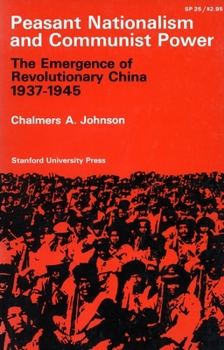Peasant Nationalism and Communist Power: The Emergence of Refolutionary China 1937-1945
Select Format
Select Condition 
Book Overview
A Stanford University Press classic.
Format:Paperback
Language:English
ISBN:0804700745
ISBN13:9780804700740
Release Date:June 1962
Publisher:Stanford University Press
Length:268 Pages
Weight:0.75 lbs.
Dimensions:0.7" x 4.5" x 8.4"
Customer Reviews
2 ratings
Review
Published by Thriftbooks.com User , 19 years ago
This is an interesting book, well worth reading, and considered by many to be a "classic" amongst the Chinese Revolution literature. Although dated, it is still an important read for anyone endeavoring to fully comprehend the Chinese Communist victory in 1949. In this book, Chalmers Johnson argues that the peasants' nationalist orientation, in response to the Japanese invasion, underpinned the Communist Party's success. In other words, he contends that a peasant nationalist movement established the Chinese state, rather than a socialist one, and that nationalism outweighed other factors that may have also played a role. Johnson supports his theory with two main lines of evidence; first, he argues that the Japanese occupation was a major factor because prior to invasion (the Jiangxi Soviet of the 1920s and 30s), the Party's land reform policies and Marxist-Leninist ideology did not win enough support. Johnson explains that the Communist Party's anti-Japanese response was considered, in rural areas, to be more successful than the Kuomintang's activities. Consequently, when the Japanese were defeated, a large proportion of the rural population (particularly in former occupied areas where Japanese savagery was witnessed first-hand) supported overwhelmingly the CCP during the civil war. According to this view, the term Communist was perhaps synonymous with the word patriot; thus joining the Communists was viewed as patriotic resistance to the Japanese. Second, Johnston compared the CCP victory with another nationalist victory, in former Yugoslavia, in which the German invasion was crucial for Communist success (comparisons were made between the resistance party in that country and the strategy of the CCP). However, Johnson's argument remains controversial, and the book must be read with this in mind. Scholars (particularly those on the left in the 1970s) have challenged several aspects of Johnson's theory and methodology, and limit the book's theoretical underpinning. In particular, it has been claimed that the book is a complete reinterpretation of events, and there is a lack of factual evidence (Johnson relies on evidence such as Japanese intelligence, rather than Chinese communist sources). Johnson has also been regarded as an "elitist" because the book lacks focus on the mass majority. For these reasons, his book is perhaps less persuasive now than it once was. Moreover, the book's sole focus on peasant nationalism seems unbalanced, and therefore not necessarily a general academic overview of the revolution. Nonetheless, a good read for those interested in the debate about the factors that fuelled the Chinese Revolution.
Communism or Nationalism?
Published by Thriftbooks.com User , 24 years ago
In this well written thoughtful work Chalmers Johnson makes a strong case for what he sees as a more accurate approach to Chinese Communist history and the reasons for the success of the CCP where the KMT failed. For those of you who may be wondering how it was possible for the CCP to go from nearly being wiped out in Jiangxi to conquering all of China, this text has many feasible answers. It is also a clear study of the use of social mobilization and Nationalism in communist propaganda in both China and Yugoslavia. Johnson uses many Japanese sources, supporting his claim for the influence of the Japanese invasion of China(1931 or 1937 depending on your point of view) as a leading cause for the success of the CCP. For those who are interested in contemporary Chinese history and Asian geo-politics this book is GREAT! I would recomend it to any student of Asian studies.






